People Management Report: Effective Management and HR Strategies
VerifiedAdded on 2023/01/03
|7
|2572
|87
Report
AI Summary
This report provides an in-depth analysis of people management, focusing on the skills required for effective managers, key HR processes that support performance management, and contemporary issues faced by line managers. The report examines managerial, technical, and human skills essential for coordinating and leading a workforce, with examples from Deloitte. It then details crucial HR processes, including planning, coaching, reviewing, and action, to enhance employee performance. Finally, it addresses challenges such as communication gaps, teamwork issues, time management, and inadequate support, emphasizing their impact on productivity and the need for strategic solutions. The report highlights the importance of managers in navigating complex situations and maintaining employee performance.
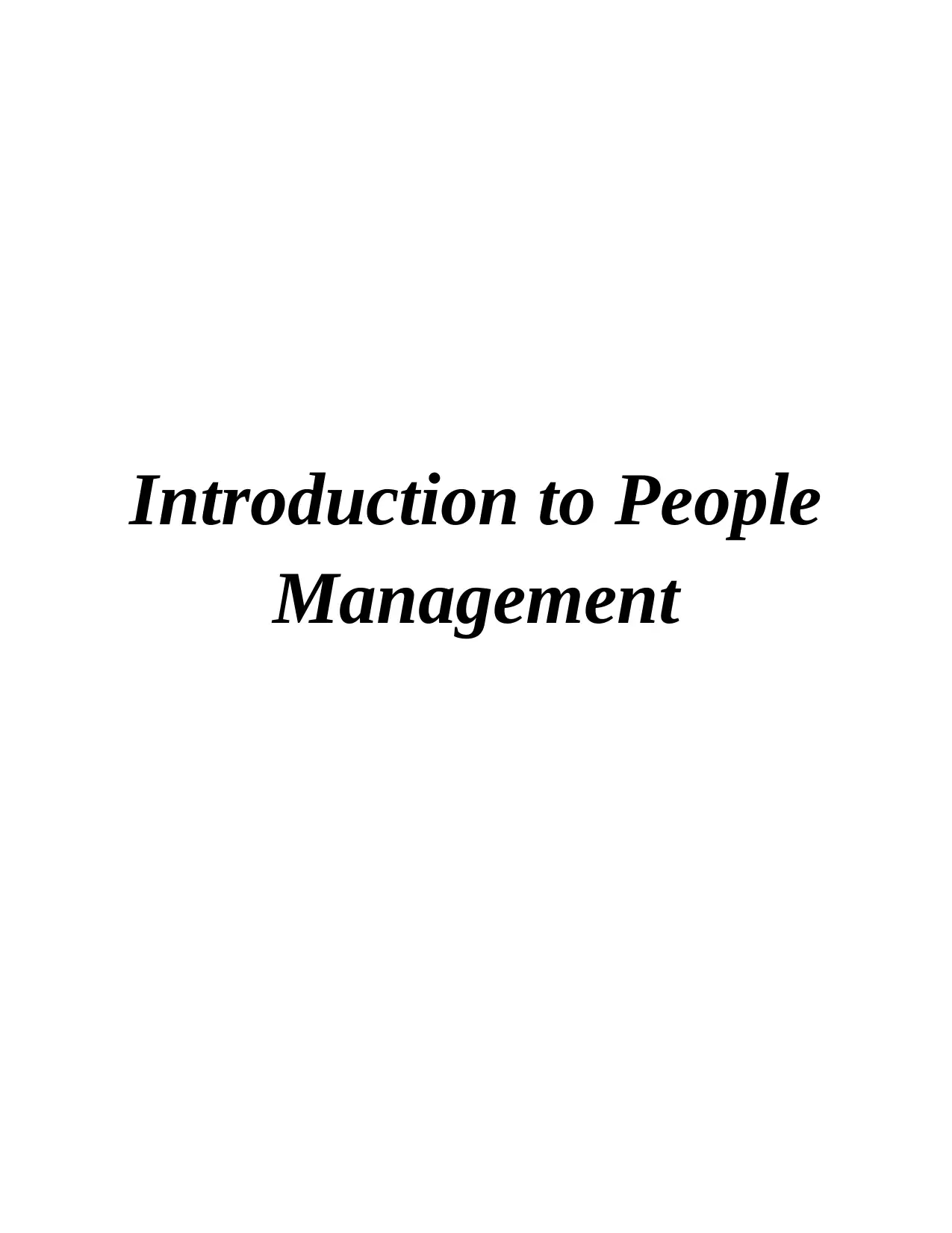
Introduction to People
Management
Management
Paraphrase This Document
Need a fresh take? Get an instant paraphrase of this document with our AI Paraphraser
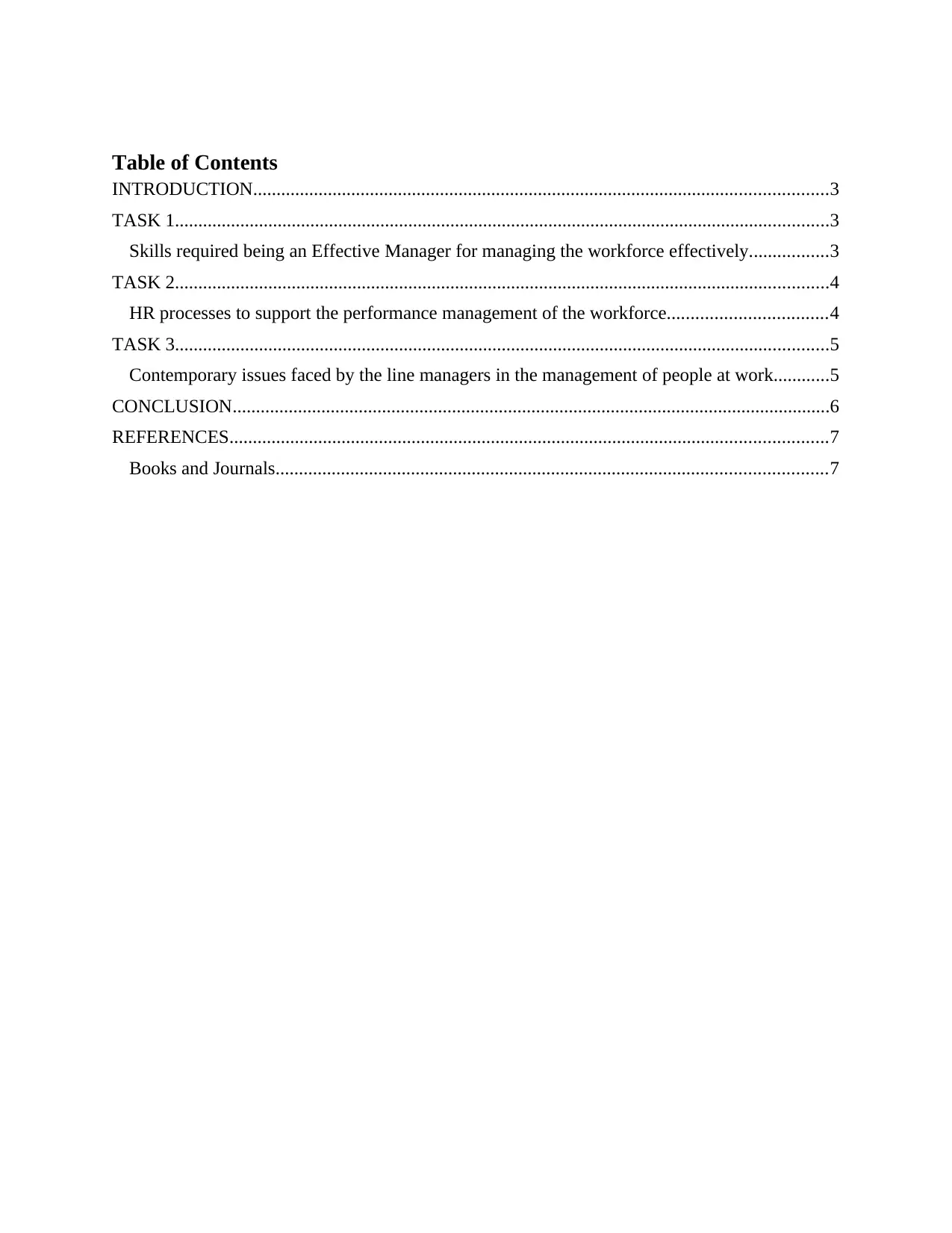
Table of Contents
INTRODUCTION...........................................................................................................................3
TASK 1............................................................................................................................................3
Skills required being an Effective Manager for managing the workforce effectively.................3
TASK 2............................................................................................................................................4
HR processes to support the performance management of the workforce..................................4
TASK 3............................................................................................................................................5
Contemporary issues faced by the line managers in the management of people at work............5
CONCLUSION................................................................................................................................6
REFERENCES................................................................................................................................7
Books and Journals......................................................................................................................7
INTRODUCTION...........................................................................................................................3
TASK 1............................................................................................................................................3
Skills required being an Effective Manager for managing the workforce effectively.................3
TASK 2............................................................................................................................................4
HR processes to support the performance management of the workforce..................................4
TASK 3............................................................................................................................................5
Contemporary issues faced by the line managers in the management of people at work............5
CONCLUSION................................................................................................................................6
REFERENCES................................................................................................................................7
Books and Journals......................................................................................................................7
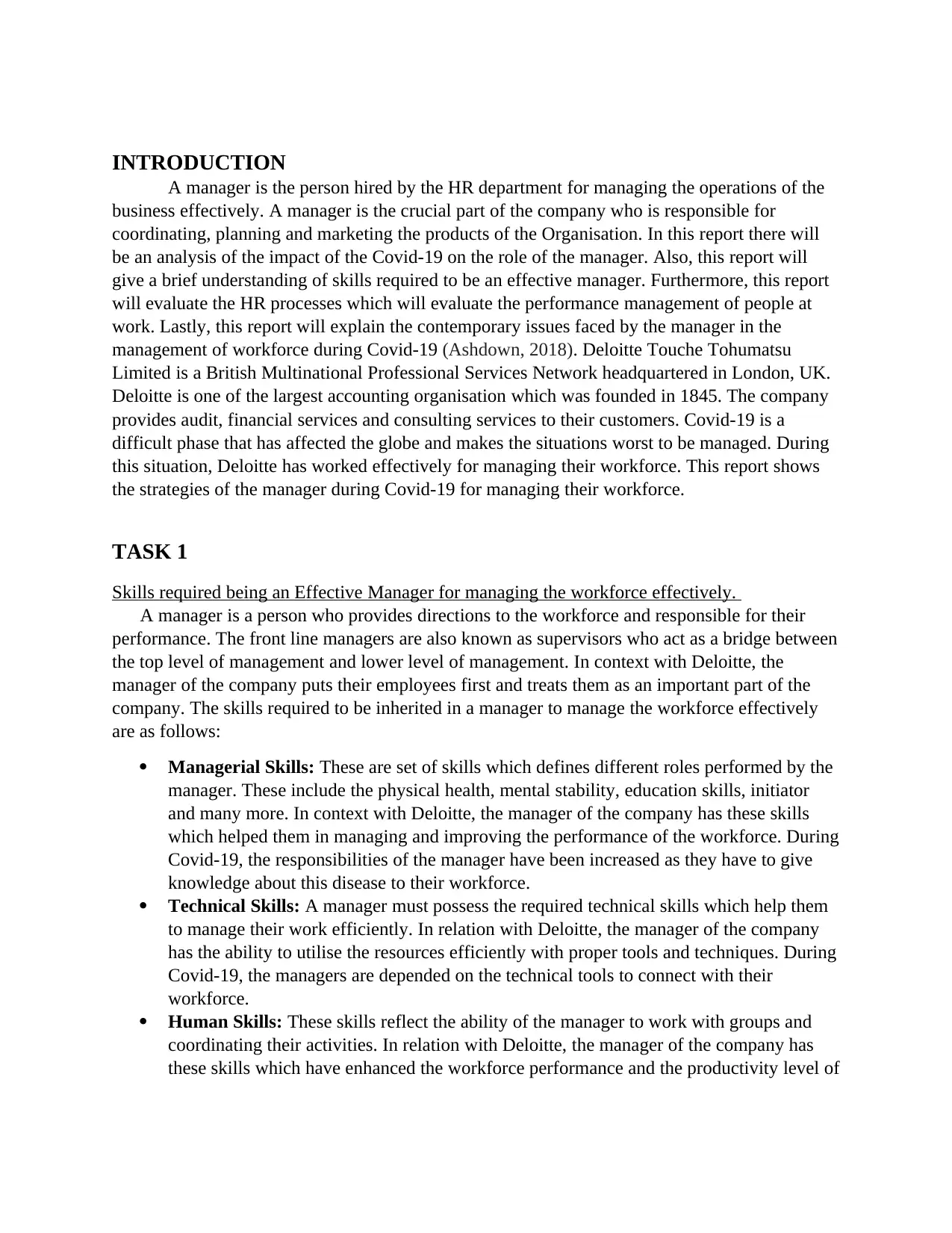
INTRODUCTION
A manager is the person hired by the HR department for managing the operations of the
business effectively. A manager is the crucial part of the company who is responsible for
coordinating, planning and marketing the products of the Organisation. In this report there will
be an analysis of the impact of the Covid-19 on the role of the manager. Also, this report will
give a brief understanding of skills required to be an effective manager. Furthermore, this report
will evaluate the HR processes which will evaluate the performance management of people at
work. Lastly, this report will explain the contemporary issues faced by the manager in the
management of workforce during Covid-19 (Ashdown, 2018). Deloitte Touche Tohumatsu
Limited is a British Multinational Professional Services Network headquartered in London, UK.
Deloitte is one of the largest accounting organisation which was founded in 1845. The company
provides audit, financial services and consulting services to their customers. Covid-19 is a
difficult phase that has affected the globe and makes the situations worst to be managed. During
this situation, Deloitte has worked effectively for managing their workforce. This report shows
the strategies of the manager during Covid-19 for managing their workforce.
TASK 1
Skills required being an Effective Manager for managing the workforce effectively.
A manager is a person who provides directions to the workforce and responsible for their
performance. The front line managers are also known as supervisors who act as a bridge between
the top level of management and lower level of management. In context with Deloitte, the
manager of the company puts their employees first and treats them as an important part of the
company. The skills required to be inherited in a manager to manage the workforce effectively
are as follows:
Managerial Skills: These are set of skills which defines different roles performed by the
manager. These include the physical health, mental stability, education skills, initiator
and many more. In context with Deloitte, the manager of the company has these skills
which helped them in managing and improving the performance of the workforce. During
Covid-19, the responsibilities of the manager have been increased as they have to give
knowledge about this disease to their workforce.
Technical Skills: A manager must possess the required technical skills which help them
to manage their work efficiently. In relation with Deloitte, the manager of the company
has the ability to utilise the resources efficiently with proper tools and techniques. During
Covid-19, the managers are depended on the technical tools to connect with their
workforce.
Human Skills: These skills reflect the ability of the manager to work with groups and
coordinating their activities. In relation with Deloitte, the manager of the company has
these skills which have enhanced the workforce performance and the productivity level of
A manager is the person hired by the HR department for managing the operations of the
business effectively. A manager is the crucial part of the company who is responsible for
coordinating, planning and marketing the products of the Organisation. In this report there will
be an analysis of the impact of the Covid-19 on the role of the manager. Also, this report will
give a brief understanding of skills required to be an effective manager. Furthermore, this report
will evaluate the HR processes which will evaluate the performance management of people at
work. Lastly, this report will explain the contemporary issues faced by the manager in the
management of workforce during Covid-19 (Ashdown, 2018). Deloitte Touche Tohumatsu
Limited is a British Multinational Professional Services Network headquartered in London, UK.
Deloitte is one of the largest accounting organisation which was founded in 1845. The company
provides audit, financial services and consulting services to their customers. Covid-19 is a
difficult phase that has affected the globe and makes the situations worst to be managed. During
this situation, Deloitte has worked effectively for managing their workforce. This report shows
the strategies of the manager during Covid-19 for managing their workforce.
TASK 1
Skills required being an Effective Manager for managing the workforce effectively.
A manager is a person who provides directions to the workforce and responsible for their
performance. The front line managers are also known as supervisors who act as a bridge between
the top level of management and lower level of management. In context with Deloitte, the
manager of the company puts their employees first and treats them as an important part of the
company. The skills required to be inherited in a manager to manage the workforce effectively
are as follows:
Managerial Skills: These are set of skills which defines different roles performed by the
manager. These include the physical health, mental stability, education skills, initiator
and many more. In context with Deloitte, the manager of the company has these skills
which helped them in managing and improving the performance of the workforce. During
Covid-19, the responsibilities of the manager have been increased as they have to give
knowledge about this disease to their workforce.
Technical Skills: A manager must possess the required technical skills which help them
to manage their work efficiently. In relation with Deloitte, the manager of the company
has the ability to utilise the resources efficiently with proper tools and techniques. During
Covid-19, the managers are depended on the technical tools to connect with their
workforce.
Human Skills: These skills reflect the ability of the manager to work with groups and
coordinating their activities. In relation with Deloitte, the manager of the company has
these skills which have enhanced the workforce performance and the productivity level of
⊘ This is a preview!⊘
Do you want full access?
Subscribe today to unlock all pages.

Trusted by 1+ million students worldwide
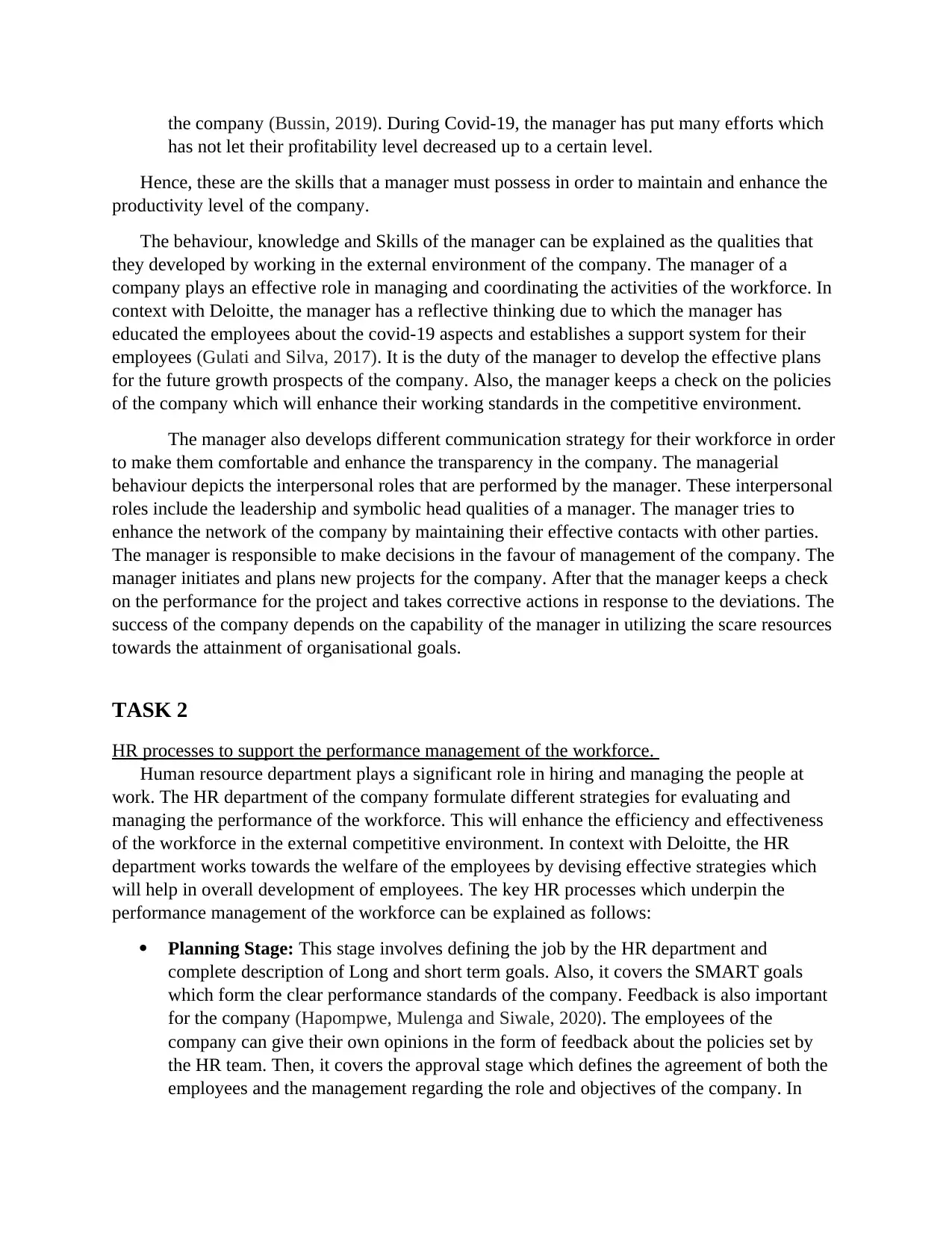
the company (Bussin, 2019). During Covid-19, the manager has put many efforts which
has not let their profitability level decreased up to a certain level.
Hence, these are the skills that a manager must possess in order to maintain and enhance the
productivity level of the company.
The behaviour, knowledge and Skills of the manager can be explained as the qualities that
they developed by working in the external environment of the company. The manager of a
company plays an effective role in managing and coordinating the activities of the workforce. In
context with Deloitte, the manager has a reflective thinking due to which the manager has
educated the employees about the covid-19 aspects and establishes a support system for their
employees (Gulati and Silva, 2017). It is the duty of the manager to develop the effective plans
for the future growth prospects of the company. Also, the manager keeps a check on the policies
of the company which will enhance their working standards in the competitive environment.
The manager also develops different communication strategy for their workforce in order
to make them comfortable and enhance the transparency in the company. The managerial
behaviour depicts the interpersonal roles that are performed by the manager. These interpersonal
roles include the leadership and symbolic head qualities of a manager. The manager tries to
enhance the network of the company by maintaining their effective contacts with other parties.
The manager is responsible to make decisions in the favour of management of the company. The
manager initiates and plans new projects for the company. After that the manager keeps a check
on the performance for the project and takes corrective actions in response to the deviations. The
success of the company depends on the capability of the manager in utilizing the scare resources
towards the attainment of organisational goals.
TASK 2
HR processes to support the performance management of the workforce.
Human resource department plays a significant role in hiring and managing the people at
work. The HR department of the company formulate different strategies for evaluating and
managing the performance of the workforce. This will enhance the efficiency and effectiveness
of the workforce in the external competitive environment. In context with Deloitte, the HR
department works towards the welfare of the employees by devising effective strategies which
will help in overall development of employees. The key HR processes which underpin the
performance management of the workforce can be explained as follows:
Planning Stage: This stage involves defining the job by the HR department and
complete description of Long and short term goals. Also, it covers the SMART goals
which form the clear performance standards of the company. Feedback is also important
for the company (Hapompwe, Mulenga and Siwale, 2020). The employees of the
company can give their own opinions in the form of feedback about the policies set by
the HR team. Then, it covers the approval stage which defines the agreement of both the
employees and the management regarding the role and objectives of the company. In
has not let their profitability level decreased up to a certain level.
Hence, these are the skills that a manager must possess in order to maintain and enhance the
productivity level of the company.
The behaviour, knowledge and Skills of the manager can be explained as the qualities that
they developed by working in the external environment of the company. The manager of a
company plays an effective role in managing and coordinating the activities of the workforce. In
context with Deloitte, the manager has a reflective thinking due to which the manager has
educated the employees about the covid-19 aspects and establishes a support system for their
employees (Gulati and Silva, 2017). It is the duty of the manager to develop the effective plans
for the future growth prospects of the company. Also, the manager keeps a check on the policies
of the company which will enhance their working standards in the competitive environment.
The manager also develops different communication strategy for their workforce in order
to make them comfortable and enhance the transparency in the company. The managerial
behaviour depicts the interpersonal roles that are performed by the manager. These interpersonal
roles include the leadership and symbolic head qualities of a manager. The manager tries to
enhance the network of the company by maintaining their effective contacts with other parties.
The manager is responsible to make decisions in the favour of management of the company. The
manager initiates and plans new projects for the company. After that the manager keeps a check
on the performance for the project and takes corrective actions in response to the deviations. The
success of the company depends on the capability of the manager in utilizing the scare resources
towards the attainment of organisational goals.
TASK 2
HR processes to support the performance management of the workforce.
Human resource department plays a significant role in hiring and managing the people at
work. The HR department of the company formulate different strategies for evaluating and
managing the performance of the workforce. This will enhance the efficiency and effectiveness
of the workforce in the external competitive environment. In context with Deloitte, the HR
department works towards the welfare of the employees by devising effective strategies which
will help in overall development of employees. The key HR processes which underpin the
performance management of the workforce can be explained as follows:
Planning Stage: This stage involves defining the job by the HR department and
complete description of Long and short term goals. Also, it covers the SMART goals
which form the clear performance standards of the company. Feedback is also important
for the company (Hapompwe, Mulenga and Siwale, 2020). The employees of the
company can give their own opinions in the form of feedback about the policies set by
the HR team. Then, it covers the approval stage which defines the agreement of both the
employees and the management regarding the role and objectives of the company. In
Paraphrase This Document
Need a fresh take? Get an instant paraphrase of this document with our AI Paraphraser
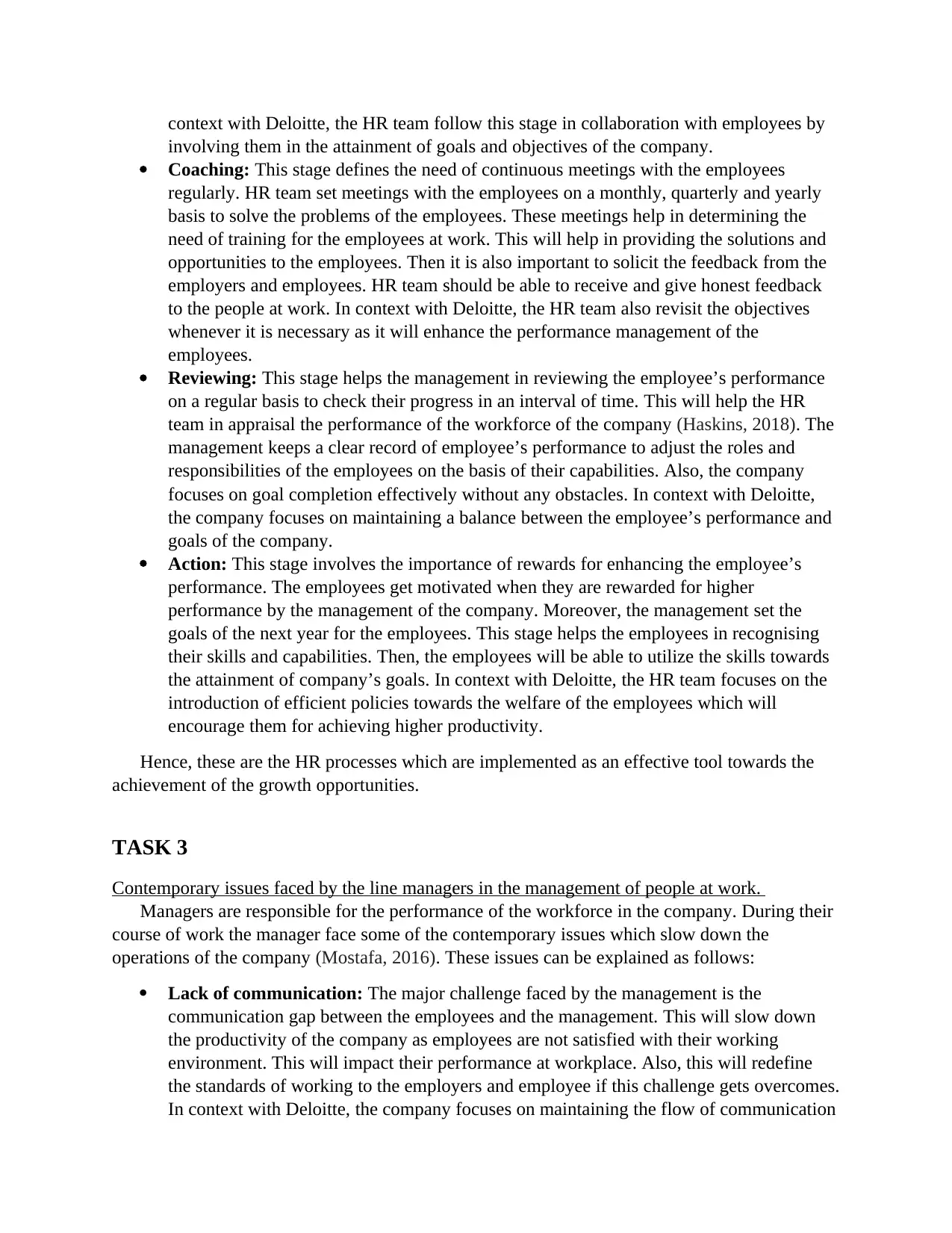
context with Deloitte, the HR team follow this stage in collaboration with employees by
involving them in the attainment of goals and objectives of the company.
Coaching: This stage defines the need of continuous meetings with the employees
regularly. HR team set meetings with the employees on a monthly, quarterly and yearly
basis to solve the problems of the employees. These meetings help in determining the
need of training for the employees at work. This will help in providing the solutions and
opportunities to the employees. Then it is also important to solicit the feedback from the
employers and employees. HR team should be able to receive and give honest feedback
to the people at work. In context with Deloitte, the HR team also revisit the objectives
whenever it is necessary as it will enhance the performance management of the
employees.
Reviewing: This stage helps the management in reviewing the employee’s performance
on a regular basis to check their progress in an interval of time. This will help the HR
team in appraisal the performance of the workforce of the company (Haskins, 2018). The
management keeps a clear record of employee’s performance to adjust the roles and
responsibilities of the employees on the basis of their capabilities. Also, the company
focuses on goal completion effectively without any obstacles. In context with Deloitte,
the company focuses on maintaining a balance between the employee’s performance and
goals of the company.
Action: This stage involves the importance of rewards for enhancing the employee’s
performance. The employees get motivated when they are rewarded for higher
performance by the management of the company. Moreover, the management set the
goals of the next year for the employees. This stage helps the employees in recognising
their skills and capabilities. Then, the employees will be able to utilize the skills towards
the attainment of company’s goals. In context with Deloitte, the HR team focuses on the
introduction of efficient policies towards the welfare of the employees which will
encourage them for achieving higher productivity.
Hence, these are the HR processes which are implemented as an effective tool towards the
achievement of the growth opportunities.
TASK 3
Contemporary issues faced by the line managers in the management of people at work.
Managers are responsible for the performance of the workforce in the company. During their
course of work the manager face some of the contemporary issues which slow down the
operations of the company (Mostafa, 2016). These issues can be explained as follows:
Lack of communication: The major challenge faced by the management is the
communication gap between the employees and the management. This will slow down
the productivity of the company as employees are not satisfied with their working
environment. This will impact their performance at workplace. Also, this will redefine
the standards of working to the employers and employee if this challenge gets overcomes.
In context with Deloitte, the company focuses on maintaining the flow of communication
involving them in the attainment of goals and objectives of the company.
Coaching: This stage defines the need of continuous meetings with the employees
regularly. HR team set meetings with the employees on a monthly, quarterly and yearly
basis to solve the problems of the employees. These meetings help in determining the
need of training for the employees at work. This will help in providing the solutions and
opportunities to the employees. Then it is also important to solicit the feedback from the
employers and employees. HR team should be able to receive and give honest feedback
to the people at work. In context with Deloitte, the HR team also revisit the objectives
whenever it is necessary as it will enhance the performance management of the
employees.
Reviewing: This stage helps the management in reviewing the employee’s performance
on a regular basis to check their progress in an interval of time. This will help the HR
team in appraisal the performance of the workforce of the company (Haskins, 2018). The
management keeps a clear record of employee’s performance to adjust the roles and
responsibilities of the employees on the basis of their capabilities. Also, the company
focuses on goal completion effectively without any obstacles. In context with Deloitte,
the company focuses on maintaining a balance between the employee’s performance and
goals of the company.
Action: This stage involves the importance of rewards for enhancing the employee’s
performance. The employees get motivated when they are rewarded for higher
performance by the management of the company. Moreover, the management set the
goals of the next year for the employees. This stage helps the employees in recognising
their skills and capabilities. Then, the employees will be able to utilize the skills towards
the attainment of company’s goals. In context with Deloitte, the HR team focuses on the
introduction of efficient policies towards the welfare of the employees which will
encourage them for achieving higher productivity.
Hence, these are the HR processes which are implemented as an effective tool towards the
achievement of the growth opportunities.
TASK 3
Contemporary issues faced by the line managers in the management of people at work.
Managers are responsible for the performance of the workforce in the company. During their
course of work the manager face some of the contemporary issues which slow down the
operations of the company (Mostafa, 2016). These issues can be explained as follows:
Lack of communication: The major challenge faced by the management is the
communication gap between the employees and the management. This will slow down
the productivity of the company as employees are not satisfied with their working
environment. This will impact their performance at workplace. Also, this will redefine
the standards of working to the employers and employee if this challenge gets overcomes.
In context with Deloitte, the company focuses on maintaining the flow of communication
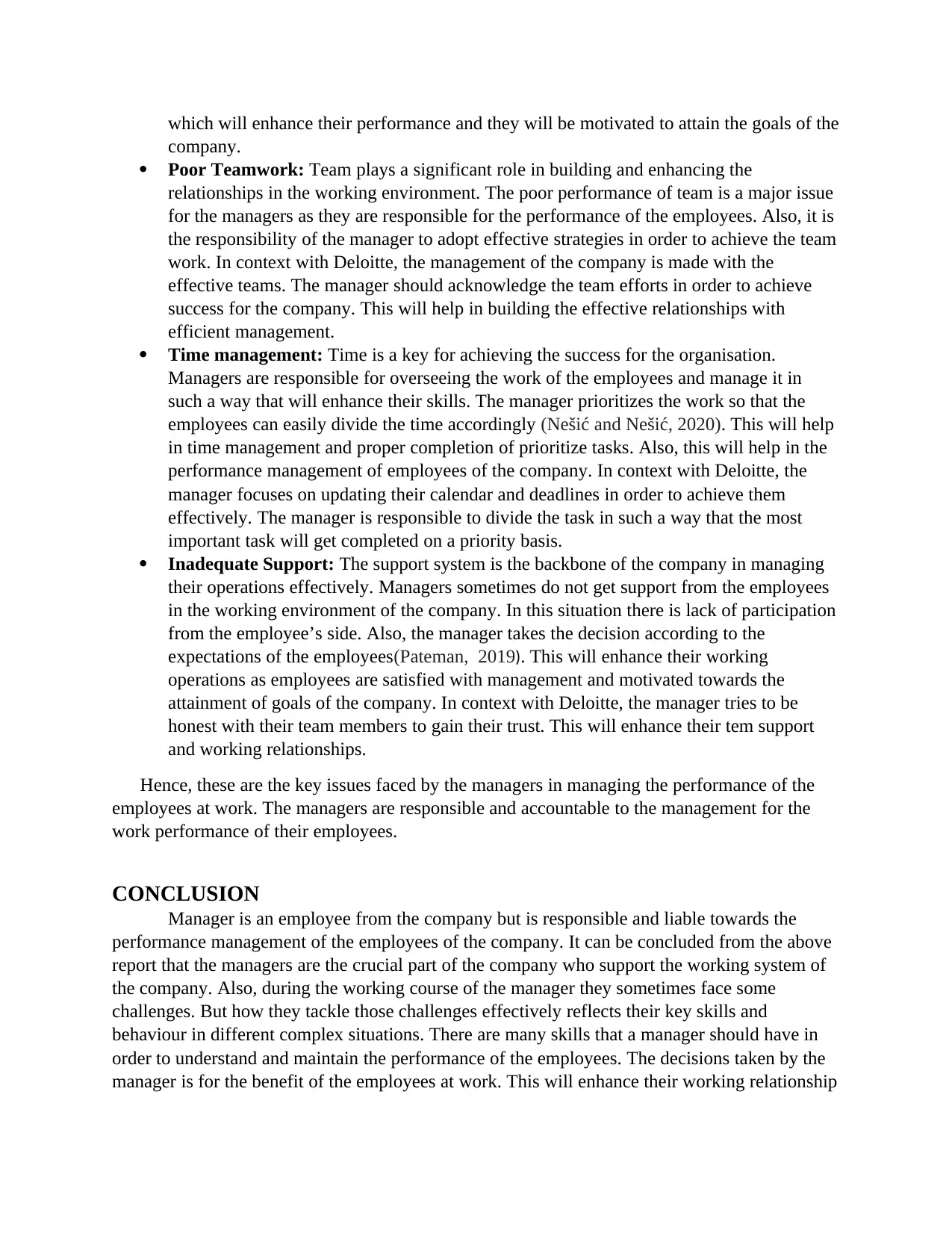
which will enhance their performance and they will be motivated to attain the goals of the
company.
Poor Teamwork: Team plays a significant role in building and enhancing the
relationships in the working environment. The poor performance of team is a major issue
for the managers as they are responsible for the performance of the employees. Also, it is
the responsibility of the manager to adopt effective strategies in order to achieve the team
work. In context with Deloitte, the management of the company is made with the
effective teams. The manager should acknowledge the team efforts in order to achieve
success for the company. This will help in building the effective relationships with
efficient management.
Time management: Time is a key for achieving the success for the organisation.
Managers are responsible for overseeing the work of the employees and manage it in
such a way that will enhance their skills. The manager prioritizes the work so that the
employees can easily divide the time accordingly (Nešić and Nešić, 2020). This will help
in time management and proper completion of prioritize tasks. Also, this will help in the
performance management of employees of the company. In context with Deloitte, the
manager focuses on updating their calendar and deadlines in order to achieve them
effectively. The manager is responsible to divide the task in such a way that the most
important task will get completed on a priority basis.
Inadequate Support: The support system is the backbone of the company in managing
their operations effectively. Managers sometimes do not get support from the employees
in the working environment of the company. In this situation there is lack of participation
from the employee’s side. Also, the manager takes the decision according to the
expectations of the employees(Pateman, 2019). This will enhance their working
operations as employees are satisfied with management and motivated towards the
attainment of goals of the company. In context with Deloitte, the manager tries to be
honest with their team members to gain their trust. This will enhance their tem support
and working relationships.
Hence, these are the key issues faced by the managers in managing the performance of the
employees at work. The managers are responsible and accountable to the management for the
work performance of their employees.
CONCLUSION
Manager is an employee from the company but is responsible and liable towards the
performance management of the employees of the company. It can be concluded from the above
report that the managers are the crucial part of the company who support the working system of
the company. Also, during the working course of the manager they sometimes face some
challenges. But how they tackle those challenges effectively reflects their key skills and
behaviour in different complex situations. There are many skills that a manager should have in
order to understand and maintain the performance of the employees. The decisions taken by the
manager is for the benefit of the employees at work. This will enhance their working relationship
company.
Poor Teamwork: Team plays a significant role in building and enhancing the
relationships in the working environment. The poor performance of team is a major issue
for the managers as they are responsible for the performance of the employees. Also, it is
the responsibility of the manager to adopt effective strategies in order to achieve the team
work. In context with Deloitte, the management of the company is made with the
effective teams. The manager should acknowledge the team efforts in order to achieve
success for the company. This will help in building the effective relationships with
efficient management.
Time management: Time is a key for achieving the success for the organisation.
Managers are responsible for overseeing the work of the employees and manage it in
such a way that will enhance their skills. The manager prioritizes the work so that the
employees can easily divide the time accordingly (Nešić and Nešić, 2020). This will help
in time management and proper completion of prioritize tasks. Also, this will help in the
performance management of employees of the company. In context with Deloitte, the
manager focuses on updating their calendar and deadlines in order to achieve them
effectively. The manager is responsible to divide the task in such a way that the most
important task will get completed on a priority basis.
Inadequate Support: The support system is the backbone of the company in managing
their operations effectively. Managers sometimes do not get support from the employees
in the working environment of the company. In this situation there is lack of participation
from the employee’s side. Also, the manager takes the decision according to the
expectations of the employees(Pateman, 2019). This will enhance their working
operations as employees are satisfied with management and motivated towards the
attainment of goals of the company. In context with Deloitte, the manager tries to be
honest with their team members to gain their trust. This will enhance their tem support
and working relationships.
Hence, these are the key issues faced by the managers in managing the performance of the
employees at work. The managers are responsible and accountable to the management for the
work performance of their employees.
CONCLUSION
Manager is an employee from the company but is responsible and liable towards the
performance management of the employees of the company. It can be concluded from the above
report that the managers are the crucial part of the company who support the working system of
the company. Also, during the working course of the manager they sometimes face some
challenges. But how they tackle those challenges effectively reflects their key skills and
behaviour in different complex situations. There are many skills that a manager should have in
order to understand and maintain the performance of the employees. The decisions taken by the
manager is for the benefit of the employees at work. This will enhance their working relationship
⊘ This is a preview!⊘
Do you want full access?
Subscribe today to unlock all pages.

Trusted by 1+ million students worldwide
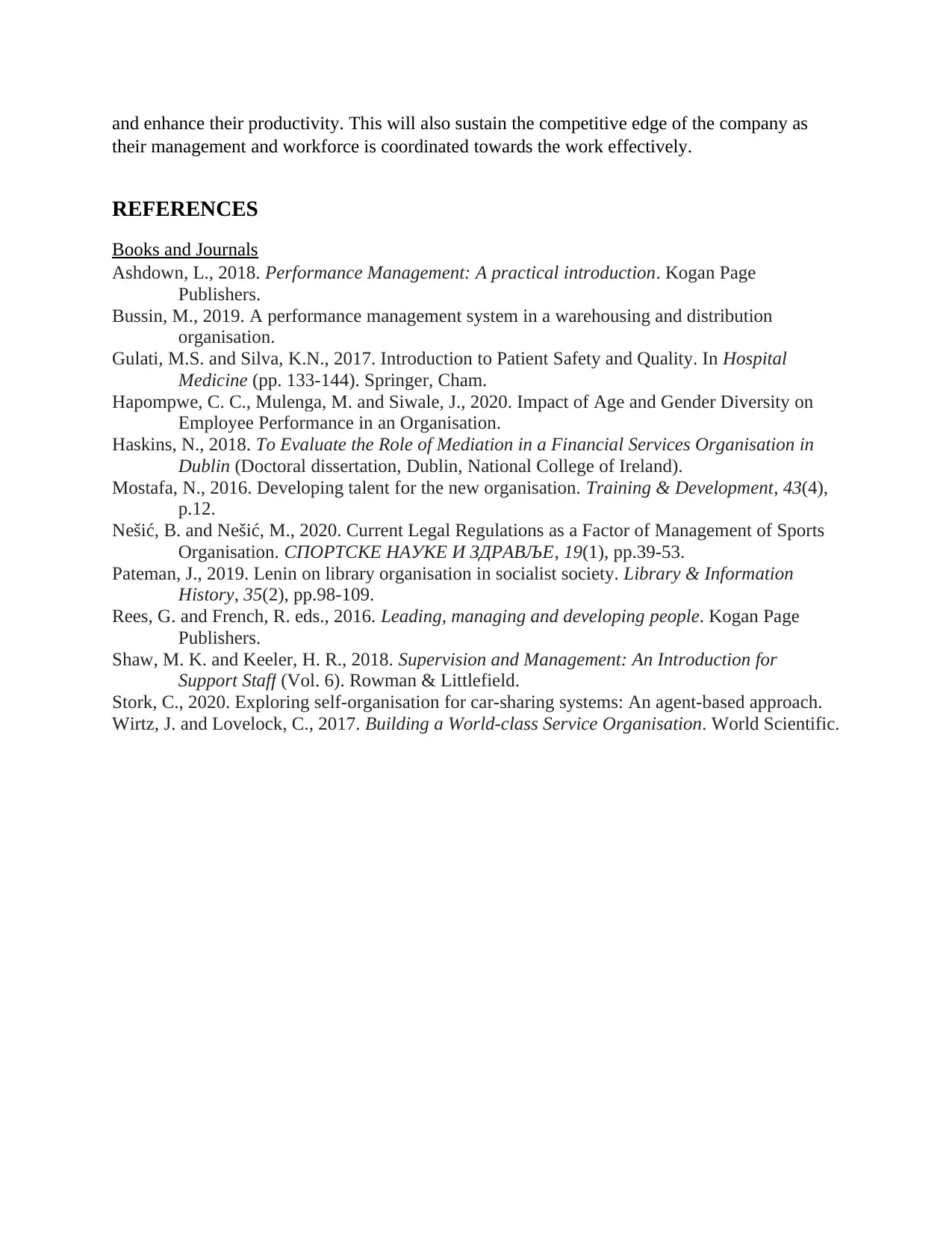
and enhance their productivity. This will also sustain the competitive edge of the company as
their management and workforce is coordinated towards the work effectively.
REFERENCES
Books and Journals
Ashdown, L., 2018. Performance Management: A practical introduction. Kogan Page
Publishers.
Bussin, M., 2019. A performance management system in a warehousing and distribution
organisation.
Gulati, M.S. and Silva, K.N., 2017. Introduction to Patient Safety and Quality. In Hospital
Medicine (pp. 133-144). Springer, Cham.
Hapompwe, C. C., Mulenga, M. and Siwale, J., 2020. Impact of Age and Gender Diversity on
Employee Performance in an Organisation.
Haskins, N., 2018. To Evaluate the Role of Mediation in a Financial Services Organisation in
Dublin (Doctoral dissertation, Dublin, National College of Ireland).
Mostafa, N., 2016. Developing talent for the new organisation. Training & Development, 43(4),
p.12.
Nešić, B. and Nešić, M., 2020. Current Legal Regulations as a Factor of Management of Sports
Organisation. СПОРТСКЕ НАУКЕ И ЗДРАВЉЕ, 19(1), pp.39-53.
Pateman, J., 2019. Lenin on library organisation in socialist society. Library & Information
History, 35(2), pp.98-109.
Rees, G. and French, R. eds., 2016. Leading, managing and developing people. Kogan Page
Publishers.
Shaw, M. K. and Keeler, H. R., 2018. Supervision and Management: An Introduction for
Support Staff (Vol. 6). Rowman & Littlefield.
Stork, C., 2020. Exploring self-organisation for car-sharing systems: An agent-based approach.
Wirtz, J. and Lovelock, C., 2017. Building a World-class Service Organisation. World Scientific.
their management and workforce is coordinated towards the work effectively.
REFERENCES
Books and Journals
Ashdown, L., 2018. Performance Management: A practical introduction. Kogan Page
Publishers.
Bussin, M., 2019. A performance management system in a warehousing and distribution
organisation.
Gulati, M.S. and Silva, K.N., 2017. Introduction to Patient Safety and Quality. In Hospital
Medicine (pp. 133-144). Springer, Cham.
Hapompwe, C. C., Mulenga, M. and Siwale, J., 2020. Impact of Age and Gender Diversity on
Employee Performance in an Organisation.
Haskins, N., 2018. To Evaluate the Role of Mediation in a Financial Services Organisation in
Dublin (Doctoral dissertation, Dublin, National College of Ireland).
Mostafa, N., 2016. Developing talent for the new organisation. Training & Development, 43(4),
p.12.
Nešić, B. and Nešić, M., 2020. Current Legal Regulations as a Factor of Management of Sports
Organisation. СПОРТСКЕ НАУКЕ И ЗДРАВЉЕ, 19(1), pp.39-53.
Pateman, J., 2019. Lenin on library organisation in socialist society. Library & Information
History, 35(2), pp.98-109.
Rees, G. and French, R. eds., 2016. Leading, managing and developing people. Kogan Page
Publishers.
Shaw, M. K. and Keeler, H. R., 2018. Supervision and Management: An Introduction for
Support Staff (Vol. 6). Rowman & Littlefield.
Stork, C., 2020. Exploring self-organisation for car-sharing systems: An agent-based approach.
Wirtz, J. and Lovelock, C., 2017. Building a World-class Service Organisation. World Scientific.
1 out of 7
Related Documents
Your All-in-One AI-Powered Toolkit for Academic Success.
+13062052269
info@desklib.com
Available 24*7 on WhatsApp / Email
![[object Object]](/_next/static/media/star-bottom.7253800d.svg)
Unlock your academic potential
Copyright © 2020–2026 A2Z Services. All Rights Reserved. Developed and managed by ZUCOL.





